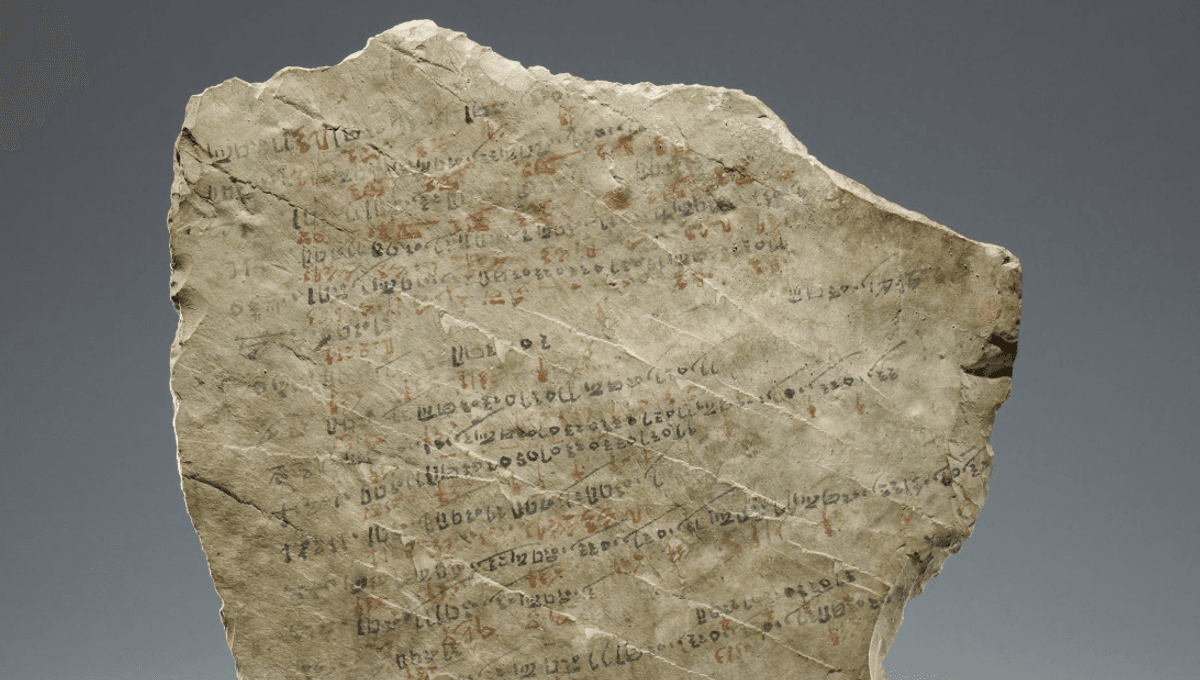
What’s the lamest excuse you’ve ever used to get off work? Go on, we won’t tell anyone – or, say, commit it to stone in a way that’s readable thousands of years from now. Unfortunately for a group of Ancient Egyptians, such evidence of their slack-offery sits in the British Museum on an artifact known as Asset 514988001: an ostracon with an attendance register etched onto its surface.
“Limestone ostracon labelled ‘Year 40’ of Ramses II on the top of the front side and providing a workmen’s register for 280 days of the year,” reads the artifact’s description.
“There are twenty-four lines of New Egyptian hieratic on the front and twenty-one lines on the back. A list of forty names is arranged in columns on the right edge of each side, followed to the left by dates written in black in a horizontal line. Above most dates is a word or phrase in red, indicating the reason why this individual was absent from work on that date.”
Dating back to 1250 BCE means that the workforce of Ancient Egyptians faced slightly different challenges in their day-to-day working lives than us. Among the 40 employees listed, there are some doozies for entries, some of them relatable, others… considerably less so.
Seba called in sick after getting nipped by a scorpion, writes Madeleine Muzdakis for My Modern Met. Then poor Pennub had to look after his ill mother. Indeed, caring for others appears to have cropped up a few times as several entries for the working men are due to “wife or daughter bleeding” in reference to menstruating relatives. For an ancient society, it seems they were very progressive when it came to making what can be a trying time of the month a little easier.
Helping the family came in all forms, as several employees are also documented as having taken time off to embalm and wrap their deceased relatives. Something about getting out the embalming ointments that really squashes the Out Of Office feeling.
We know that embalming was a complex and lengthy process that involved ingredients sourced from across the globe, far-flung from the toilet paper wrapping we recreate in modern party games. The recent discovery of an Ancient Egyptian mummification workshop in Saqqara enabled researchers to reveal the secret recipes that embalmers used to preserve different body parts. They were so complex, in fact, it’s suggested that the Egyptians’ passion for mummification helped to prop up an ancient global trade network.
When they weren’t embalming, another chore that took up a lot of workers’ time was brewing beer. You’d likely receive a few raised eyebrows if you tried to use that excuse today, but it was a common and respectable one back then.
Beer in Ancient Egypt wasn’t the bubbly sesh beverage we know today, but a thick, sweet, and nutritious drink that was imbibed by children and adults. It was of central importance to ancient Egyptian society and had ties to the gods, to whom it was given as an offering. Wages were sometimes paid in beer, and it was rationed three times daily to laborers building the pyramids.
The fascinating snapshot into Egyptian life reveals that flexible working is far from a modern invention. In these unprecedented times, perhaps we could all use the occasional day off for a spot of relaxing brewing.
Godspeed with your HR departments.
[H/T: BoingBoing]
Source Link: "Scorpion Bite" And "Embalming Relatives" Among Reasons Egyptians Skipped Work, Tablet Reveals